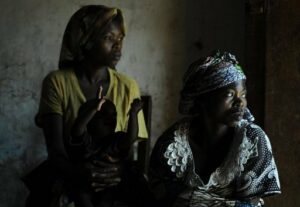By Mark Ellis

Between five and six million people have died as a result of the conflict in the Democratic Republic of Congo (DRC), which some have termed “Africa’s World War.” This makes it the world’s deadliest conflict since World War II, with a death toll exceeding Bosnia, Kosovo, Rwanda and Darfur in Sudan.
Beginning in 1998, the conflict has involved nine African nations. Despite the signing of peace accords in 2003, fighting continues in the mineral-rich eastern portion of the country. The prevalence and intensity of rape and other sexual violence in eastern Congo has been described as the worst in the world.
“One out of three women have been raped in the eastern DRC,” according to Camille Ntoto, founder of Africa New Day, citing figures from the U.N. Office for the Coordination of Humanitarian Affairs.
The city of Goma, where Camille is based, was recently overrun by M23 guerrillas for 11 days as thousands of U.N. troops looked on passively. “There was no electricity and in most areas no water,” Camille reports. “The banks were closed and some were looted. The governor’s home was completely ransacked.”
After an emergency meeting between the leaders of Rwanda, Uganda, and DRC – along with intense international pressure — the rebels pulled out of Goma on December 1. They withdrew to a city only 20 kilometers away and vowed to retake Goma at any time if their demands are not met.
“The U.N. peacekeeping force in Congo costs $1.0 billion a year,” Camille notes. “The people are wondering what good do they do?”
Camille also faults the government of Rwanda, which a recent U.N. report implicates in the violence in eastern Congo. “President Kagame comes (to the West) as a savior and visionary, but he is really an assassin and a dictator,” Camille charges, noting that Kagame has been embraced by prominent ministry and political leaders. “He is playing a tricky game; he is not who he claims to be.”
Among the estimated 5.4 million killed in the Congo war, almost half were children. Many died from malnutrition, malaria, diarrhea and pneumonia.
“Rape was used as an instrument of war,” Camille reports. “Foreign troops wanted to humiliate the communities, so the men will feel powerless because they were not able to protect their wives.”
Some female rape victims suffer from fistula, a medical condition resulting from a tear between the birth canal and anal cavity. “The soldiers finish their atrocious acts by shoving objects into their private parts, leaving these women in a very bad situation.” The shame resulting from their infertility or incontinence causes some women to be shunned and cast out of their villages.
It was not only foreign troops engaged in rape, but sadly, Congolese men began to imitate the foreigners’ atrocities. “It was the Rwandan and Ugandan troops initially doing this, but the locals took up the practice and now Congolese are doing it to their own women,” he reports. “It was to do with power, tribal strife, and ethnic tensions.”
Camille’s wife, Esther, has ministered to many of the female victims. She would often come home and tell her husband the horrible stories she heard. After a certain point, Camille could no longer listen. Heartsick, he turned to the Lord in prayer.
“What are we doing wrong?” he asked God. “There must be something in the perception and mindset of the men that is completely wrong,” he decided.
As Camille prayed, it became clear that he and his wife had been addressing the consequences of rape, but they had not reached the perpetrators.
In response to God’s leading, Camille spent over a year developing a discipleship program for men he calls “Sons of Congo,” which involves a curriculum and radio programs for men meeting in small groups.
“We are targeting men in churches, prisons, the police and military,” he says. When he launched the program last year, his goal was to reach 500 men. Astoundingly, 8,000 men have completed it.
“Their lives are being changed,” he says. “We’re hearing moving testimonies from the men, and even more importantly, the women.”
“We are the church. We have to be the light of the world and push back with love.”




good job on this article and thank you for being so thorough. i was so blessed to read the “truth” being told. thank you Mark. I am most grateful for your skill and wllingness. Kathi Winter
God Reports,
does your ministry collect funds to help these DRC/Congolese Women who are being wounded? is so, will you email me back and tell me if i can call make an telephone debit card donation to your work with these Women. if i can make a phone donation, please remember to include a phone number.
c fiensy cfiensy1@juno.com
Chris, Please call 949-548-8999 and/or 949-872-7687. mcsusanmccarthy@yahoo.com. Thanks for your interest. Blessings. CN
A moving testimony.
I know and have been part of the Leadership Academy, one of the programs that Africa New Day leads in the in Goma.
Thank you P. Camille for the work you are doing here in Goma.
Thank you for an article that speaks the truth. May the U.S. lend help by holding the U.N troops and especially the Rwandan government accountable. May God’s protection be over the Congolese people, protecting them from invasion, rape, theft of their land’s resources, violence, and injustice. May the Congolese people be safe and covered by God for all their needs and may the source of their hope be glorified.
Thank you pastor,
We are so happy to see things you are doing in DRC,those things shows that you are a true missionary of God, He will bless you more than you need.
Comments are closed.